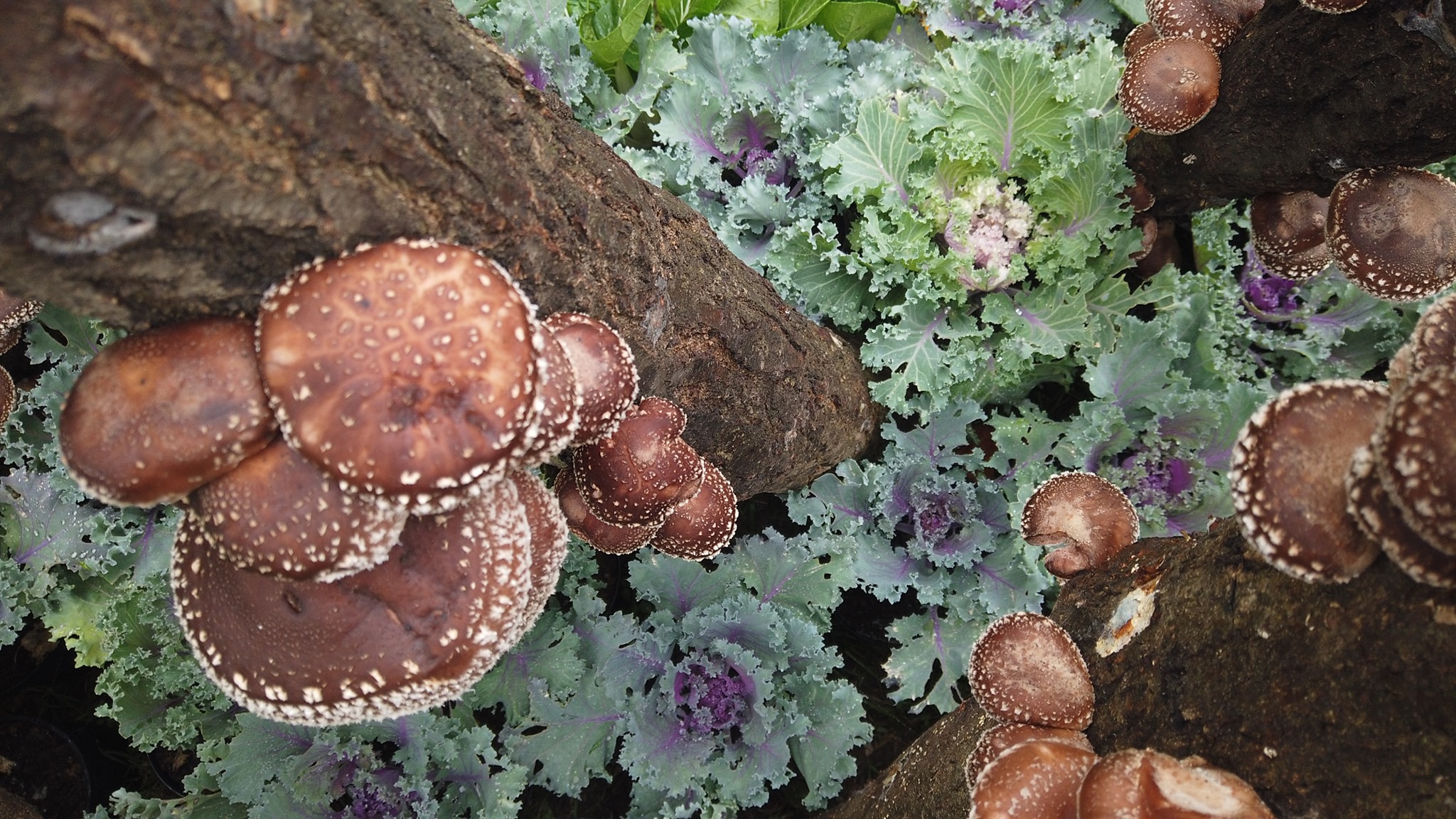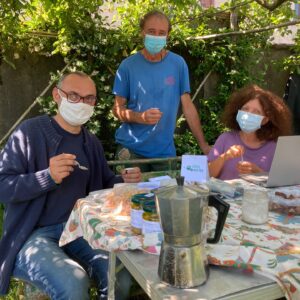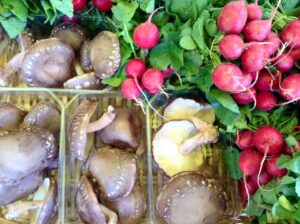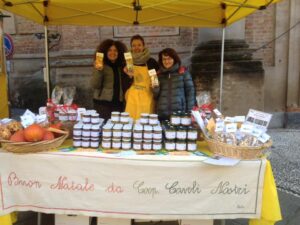Cavoli Nostri Social Agricultural Cooperative (Cooperativa Sociale Agricola Cavoli Nostri)

An agricultural social cooperative company growing, selling and preserving organic vegetables and providing job opportunities for disadvantaged workers near Turin. We have recently focused on growing shiitake mushrooms (which are not widely known in Italy). They have been greatly appreciated by local restaurants and customers, so we aim to increase our production in the future.
Key words: Social farming, organic, mushrooms, vegetables, cooperative
Short description
Name of the initiative? Cavoli Nostri Social Agricultural Cooperative
Country Italy
Region Piedmont (near Turin)
What kind of initiative Farming/production, processing, marketing, biodiversity, community
The Story
We began in April 2011 with a dozen people from different backgrounds. Two were monks living in a religious house outside of Turin. They had land and some agricultural equipment, because traditionally they involved the persons with intellectual disabilities living at the religious house in agricultural activity. They wanted to continue this activity in a way that was legalised and recognised by the state. Most of the rest of us were consultants and until then we had an idea of social farming, but no practical experience in the field. Three of our core workers were people with intellectual challenges living at the religious house, but when they reached retirement age, they were replaced by younger people living with their families.
“…we had an idea of social farming, but no practical experience in the field.”
Over time the group changed as this was voluntary for many of us and we had to devote time to our paying job. Currently the company is mainly managed by three of us (women). A fourth member is a licensed mycologist who gives us precious advice about mushrooms. We currently have three disadvantaged workers, two with intellection disabilities (one of them is temporarily not employed, because of difficulties connected with the COVID-19 pandemic) and one who is recovering from addiction.
 In addition to cultivation and processing for sale, since the beginning of our activity we also designed and managed several social farming projects. Since 2016, two of these became especially relevant for us: the first is hosting people on the farm who have been referred to us by social services with a variety of social challenges. They take care of a small plot of land and everything that is produced on it is donated to the social services for local families in need (this project is temporarily not active, because of restrictions connected with the COVID-19 pandemic, but it will most likely resume as soon as the health situation allows it). We also take care of a small garden on the roof of a public library in a nearby municipality with people with severe intellectual impairment. This is primarily an educational and recreational activity for them.
In addition to cultivation and processing for sale, since the beginning of our activity we also designed and managed several social farming projects. Since 2016, two of these became especially relevant for us: the first is hosting people on the farm who have been referred to us by social services with a variety of social challenges. They take care of a small plot of land and everything that is produced on it is donated to the social services for local families in need (this project is temporarily not active, because of restrictions connected with the COVID-19 pandemic, but it will most likely resume as soon as the health situation allows it). We also take care of a small garden on the roof of a public library in a nearby municipality with people with severe intellectual impairment. This is primarily an educational and recreational activity for them.
” We had requests from other people who wanted to come and help us for free, but it wasn’t possible.”
 We registered as a cooperative company because we had a vision to sell our produce so there would be resources from this to pay disadvantaged workers. According to Italian legislation we are a ‘type B social cooperative company’, which means our main goal is to provide job opportunities to disadvantaged workers. At the beginning we struggled to adapt what we had in mind to the framework of the social cooperative legislation. For example, this legislation allows social cooperatives to have a certain number of voluntary members, but this number should not exceed the number of paid workers. We had requests from other people who wanted to come and help us for free, but it wasn’t possible. We are working towards a solution where we are a small number of voluntary members managing the company and most work is paid work for disadvantaged workers.
We registered as a cooperative company because we had a vision to sell our produce so there would be resources from this to pay disadvantaged workers. According to Italian legislation we are a ‘type B social cooperative company’, which means our main goal is to provide job opportunities to disadvantaged workers. At the beginning we struggled to adapt what we had in mind to the framework of the social cooperative legislation. For example, this legislation allows social cooperatives to have a certain number of voluntary members, but this number should not exceed the number of paid workers. We had requests from other people who wanted to come and help us for free, but it wasn’t possible. We are working towards a solution where we are a small number of voluntary members managing the company and most work is paid work for disadvantaged workers.
It’s very important for us to be in collaboration with other actors. We began our cooperative within the framework of a bigger project promoted by Coldiretti Torino (farmers’ organisation we belong to), which was supported by university experts. They promote collaboration between social farms encouraging us to give information and share experiences. They also try to help farms sell their products as social products.
For us, it was also very important to start cooperating with the Social Services in our area. For Social Services our farm is an important resource. For us it was a source of funding and visibility in the local community. This led to connections with other groups who then supported us.
“Collaboration takes time. You need to be open minded. At the beginning it takes time to get to know each other and understand how to cooperate, even when working with people with whom you have a lot in common, such as other farms. We have cooperated successfully with many other businesses and institutions and this was crucial for the growth of our company, but we have also had misunderstandings and experiences that did not go completely well.”
 Collaboration takes time. You need to be open minded. At the beginning it takes time to get to know each other and understand how to cooperate, even when working with people with whom you have a lot in common, such as other farms. We have cooperated successfully with many other businesses and institutions and this was crucial for the growth of our company, but we have also had misunderstandings and experiences that did not go completely well.
Collaboration takes time. You need to be open minded. At the beginning it takes time to get to know each other and understand how to cooperate, even when working with people with whom you have a lot in common, such as other farms. We have cooperated successfully with many other businesses and institutions and this was crucial for the growth of our company, but we have also had misunderstandings and experiences that did not go completely well.
The biggest challenge from the beginning was infrastructural issues. We started our farm in cooperation with the religious house that gave us land and some equipment and buildings in exchange for providing all year long vegetables for all their guests, but we didn’t have a clear picture of what we were going to build, so we were not able to secure the basis of our activities and suddenly we couldn’t count anymore on buildings and equipment and we had to devote a lot of time and resources in order to develop alternative solutions. As a cooperative company a problem is capital. We are all investing a lot of time in it, but investing significant amounts of money is more difficult than it would be in the case of a private company. We still don’t have a proper building to do things and this limits our possibilities a lot. For example, we used to offer some practical activities for schools which were quite successful and helpful for us economically, but we don’t have the facilities to do this now.
Additional information
https://www.facebook.com/CavoliNostri
—
Repository compiled in September 2020 by: Elena Micheletti
E-mail contact: elena.micheletti@cavolinostri.it
Etiqueta:cooperative, mushrooms, organic, social farming, Vegetables
